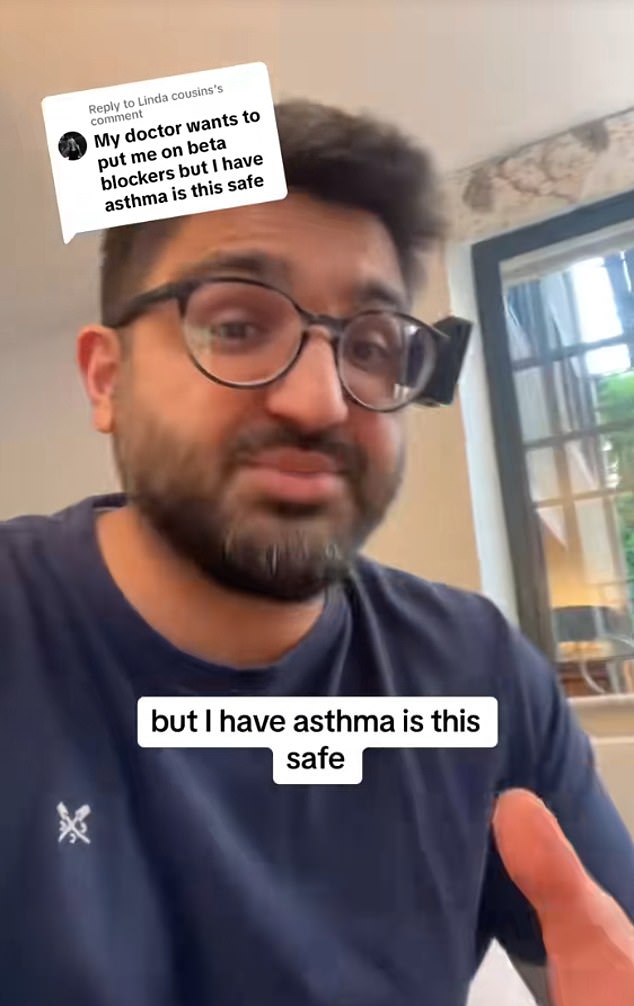[ad_1]
They are pills prescribed to millions in the UK to treat heart conditions and anxiety.
But beta blockers may pose a hidden risk to the 7.2 million people living with asthma, an NHS GP has warned.
According to the British Heart Foundation, UK doctors issue more than 50 million prescriptions for beta blockers every year.
The drugs slow the heart rate and lower blood pressure, and generall cause few side effects.
However, Dr Sooj, a family doctor with over 250,000 TikTok followers, cautioned that beta blockers can interfere with the way asthma medications work—potentially putting some patients at risk during an attack.
Asthma causes symptoms such as wheezing, coughing and chest tightness.
While generally manageable, it can become life-threatening, when severely inflamed airways make it extremely difficult to breathe.
Asthma UK reports that around 1,200 people die from asthma attacks each year in the UK, while in the US the figure is over 3,500.
In a TikTok, Dr Sooj explained: ‘If you have asthma you need to be cautious and we need to make sure you’re aware of any of the risks and potential complications of taking a beta blocker.
‘The medications we use in an acute asthma attack are called beta agonists—these help to dilate the pipes in your lungs.’
Dr Sooj explained that these beta agonists, found in many common inhalers, work by relaxing the muscles in the airways, making it easier to breathe.
But beta blockers can blunt this effect. ‘By doing that, they can worsen the symptoms of asthma,’ he said.
And it’s not just people with asthma who may be affected. Inhalers are also routinely prescribed to those with chronic obstructive pulmonary disease (COPD), an umbrella term covering long-term lung conditions such as chronic bronchitis and emphysema.
These incurable conditions can also cause severe breathing difficulties, and for this group too, beta blockers may pose a risk.
The NHS advises patients with asthma or lung disease to inform their doctor before starting beta blockers, to ensure the medication is safe.
That said, Dr Sooj added: ‘I’ve seen lots of patients with COPD or asthma who are on beta blockers and they’re completely fine with them.’

According to NHS GP Dr Sooj, if you have asthma or chronic obstructive pulmonary disease (COPD) you should think twice before taking them.
‘But this is a discussion you should have with your own doctor,’ Dr Sooj advised.
He stressed that beta blockers remain excellent medications when used appropriately, and highlighted how newer versions have improved safety profiles.
‘We now have cardioselective beta blockers, which affect the body a bit less,’ he explained, referring to drugs that primarily target the heart rather than the lungs, making them less likely to aggravate asthma or COPD.
The warning comes amid growing concerns over the use of propranolol—a non-selective beta blocker—particularly for anxiety.
Propranolol has been linked to serious side effects in high doses, including seizures, depression, and even cardiac arrest. In rare cases, patients have experienced toxic overdose.
According to recent research, the number of UK prescriptions for propranolol to treat anxiety doubled between 2003 and 2018.
While the drug can help reduce feelings of panic by lowering blood pressure and heart rate, some experts argue there is no strong evidence it effectively treats mental health conditions.
In a recent letter to The Guardian, pharmacist Christopher Sullivan wrote that propranolol is ‘associated with significant adverse outcomes’ and urged GPs to exercise extreme caution when prescribing it for anxiety.

It follows a recent warning by experts that beta blockers can put patients at risk of ‘toxic overdose’
‘Prescribing these medicines for anxiety is not recommended in national evidence-based guidelines,’ he added.
It followed comments from GP Dr Amir Khan, who told the newspaper that propananol had been linked to ‘higher rates of depression’ and warned GPs not to prescribe it to anxious patients who also suffer low mood.
‘If you are taking them long term, you can’t suddenly stop them,’ he added. ‘You need to be weaned off them.’
The risks are not thought to pertain to those taking the medicine for heart problems and other physical issues like migraine—but experts say patients with mental health troubles are vulnerable to either accidentally or purposefully taking an overdose.
[ad_2]
This article was originally published by a www.dailymail.co.uk . Read the Original article here. .

